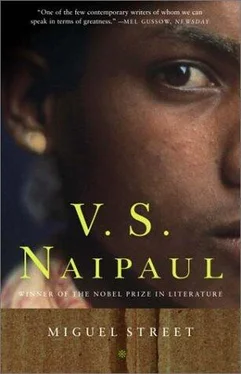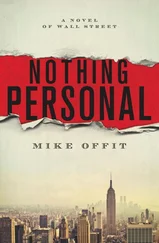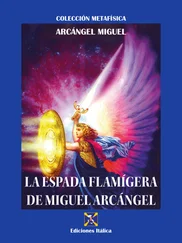‘What your mother do to get you that?’ he shouted, and I was going for him when Eddoes put a stop to it.
Eddoes said, ‘He just sad and jealous. He don’t mean anything.’
For Elias had become one of the street aristocrats. He was driving the scavenging carts.
‘No theory here,’ Elias used to say. ‘This is the practical. I really like the work.’
Everybody in Miguel Street said that Man-man was mad, and so they left him alone. But I am not so sure now that he was mad, and I can think of many people much madder than Man-man ever was.
He didn’t look mad. He was a man of medium height, thin; and he wasn’t bad-looking, either. He never stared at you the way I expected a mad man to do; and when you spoke to him you were sure of getting a very reasonable reply.
But he did have some curious habits.
He went up for every election, city council or legislative council, and then he stuck posters everywhere in the district. These posters were well printed. They just had the word ‘Vote’ and below that, Man-man’s picture.
At every election he got exactly three votes. That I couldn’t understand. Man-man voted for himself, but who were the other two?
I asked Hat.
Hat said, ‘I really can’t say, boy. Is a real mystery. Perhaps is two jokers. But they is funny sort of jokers if they do the same thing so many times. They must be mad just like he.’
And for a long time the thought of these two mad men who voted for Man-man haunted me. Every time I saw someone doing anything just a little bit odd, I wondered, ‘Is he who vote for Man-man?’
At large in the city were these two men of mystery.
Man-man never worked. But he was never idle. He was hypnotised by the word, particularly the written word, and he would spend a whole day writing a single word.
One day I met Man-man at the corner of Miguel Street.
‘Boy, where you going?’ Man-man asked.
‘I going to school,’ I said.
And Man-man, looking at me solemnly, said in a mocking way, ‘So you goes to school, eh?’
I said automatically, ‘Yes, I goes to school.’ And I found that without intending it I had imitated Man-man’s correct and very English accent.
That again was another mystery about Man-man. His accent. If you shut your eyes while he spoke, you would believe an Englishman-a good-class Englishman who wasn’t particular about grammar-was talking to you.
Man-man said, as though speaking to himself, ‘So the little man is going to school.’
Then he forgot me, and took out a long stick of chalk from his pocket and began writing on the pavement. He drew a very big’s in outline and then filled it in, and then the c and the H and the O. But then he started making several O’s, each smaller than the last, until he was writing in cursive, O after flowing O.
When I came home for lunch, he had got to French Street, and he was still writing o’s, rubbing off mistakes with a rag.
In the afternoon he had gone round the block and was practically back in Miguel Street.
I went home, changed from my school-clothes into my home-clothes and went out to the street.
He was now halfway up Miguel Street.
He said, ‘So the little man gone to school today?’
I said, ‘Yes.’
He stood up and straightened his back.
Then he squatted again and drew the outline of a massive L and filled that in slowly and lovingly.
When it was finished, he stood up and said, ‘You finish your work. I finish mine.’
Or it was like this. If you told Man-man you were going to the cricket, he would write CRICK and then concentrate on the E’S until he saw you again.
One day Man-man went to the big café at the top of Miguel Street and began barking and growling at the customers on the stools as though he were a dog. The owner, a big Portuguese man with hairy hands, said, ‘Man-man, get out of this shop before I tangle with you.’
Man-man just laughed.
They threw Man-man out.
Next day, the owner found that someone had entered his café during the night and had left all the doors open. But nothing was missing.
Hat said, ‘One thing you must never do is trouble Man-man. He remember everything.’
That night the café was entered again and the doors again left open.
The following night the café was entered and this time little blobs of excrement were left on the centre of every stool and on top of every table and at regular intervals along the counter.
The owner of the café was the laughing-stock of the street for several weeks, and it was only after a long time that people began going to the café again.
Hat said, ‘Is just like I say. Boy, I don’t like meddling with that man. These people really bad-mind, you know. God make them that way.’
It was things like this that made people leave Man-man alone. The only friend he had was a little mongrel dog, white with black spots on the ears. The dog was like Man-man in a way, too. It was a curious dog. It never barked, never looked at you, and if you looked at it, it looked away. It never made friends with any other dog, and if some dog tried either to get friendly or aggressive, Man-man’s dog gave it a brief look of disdain and ambled away, without looking back.
Man-man loved his dog, and the dog loved Man-man. They were made for each other, and Man-man couldn’t have made a living without his dog.
Man-man appeared to exercise a great control over the movements of his dog’s bowels.
Hat said, ‘That does really beat me. I can’t make that one out.’
It all began in Miguel Street.
One morning, several women got up to find that the clothes they had left to bleach overnight had been sullied by the droppings of a dog. No one wanted to use the sheets and the shirts after that, and when Man-man called, everyone was willing to give him the dirty clothes.
Man-man used to sell these clothes.
Hat said, ‘Is things like this that make me wonder whether the man really mad.’
From Miguel Street Man-man’s activities spread, and all the people who had suffered from Man-man’s dog were anxious to get other people to suffer the same thing.
We in Miguel Street became a little proud of him.
I don’t know what it was that caused Man-man to turn good. Perhaps the death of his dog had something to do with it. The dog was run over by a car, and it gave, Hat said, just one short squeak, and then it was silent.
Man-man wandered about for days, looking dazed and lost.
He no longer wrote words on the pavement; no longer spoke to me or to any of the other boys in the street. He began talking to himself, clasping his hands and shaking as though he had ague.
Then one day he said he had seen God after having a bath.
This didn’t surprise many of us. Seeing God was quite common in Port of Spain and, indeed, in Trinidad at that time. Ganesh Pundit, the mystic masseur from Fuente Grove, had started it. He had seen God, too, and had published a little booklet called What God Told Me. Many rival mystics and not a few masseurs had announced the same thing, and I suppose it was natural that since God was in the area Man-man should see Him.
Man-man began preaching at the corner of Miguel Street, under the awning of Mary’s shop. He did this every Saturday night. He let his beard grow and he dressed in a long white robe. He got a Bible and other holy things and stood in the white light of an acetylene lamp and preached. He was an impressive preacher, and he preached inanodd way. He made women cry, and he made people like Hat really worried.
He used to hold the Bible in his right hand and slap it with his left and say in his perfect English accent, ‘I have been talking to God these few days, and what he tell me about you people wasn’t really nice to hear. These days you hear all the politicians and them talking about making the island self-sufficient. You know what God tell me last night? Last night self, just after I finish eating? God say, “Man-man, come and have a look at these people.” He show me husband eating wife and wife eating husband. He show me father eating son and mother eating daughter. He show me brother eating sister and sister eating brother. That is what these politicians and them mean by saying that the island going to become self-sufficient. But, brethren, it not too late now to turn to God.’
Читать дальше












